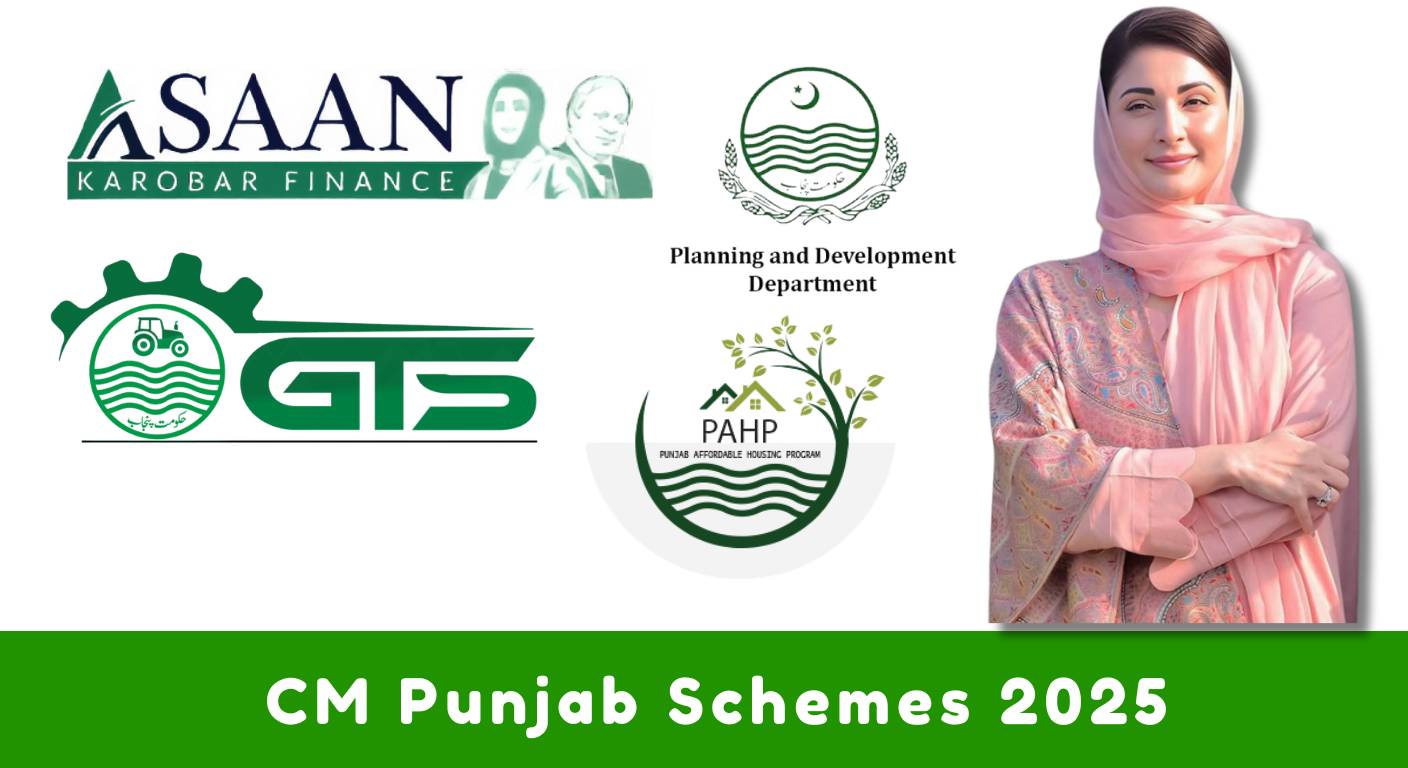Punjab’s government under CM Maryam Nawaz Sharif has announced many development and welfare schemes during 2025. These programs aim to help farmers, small businesses, poor families, disabled people, and entire communities. Below are key updates—what is new, what benefits exist, how people can use them, and what challenges remain.
1. CM Punjab Asaan Karobar Finance & Asaan Karobar Card
One of the biggest recent schemes. CM Punjab launched these schemes to support small and medium businesses. Under Asaan Karobar Finance, business owners can get interest-free loans between Rs. 10 lakh to Rs. 3 crore, with easy instalment plans. The Asaan Karobar Card gives loans between Rs. 5 lakh and Rs. 10 lakh. People interested can apply online, and a helpline (1786) is available for help.
Also, the Provincial Development Working Party (PDWP) approved budgets for both programs—each scheme was given around Rs. 9,500 million (that is Rs. 9.5 billion) in development approvals.
2. Punjab Development Program: Roads, Drainage, WASA & Water
CM Punjab has started a Punjab Development Program to fix basic infrastructure that affects many people.
- It includes repairing roads and streets, improving sewerage, drainage systems in cities.
- WASA (Water & Sanitation Agency) is being expanded so every city has its own WASA with machinery and staff.
- A Rs 50 billion program will provide clean drinking water in Southern Punjab, where many people lack safe water.
- Health units are being upgraded: Basic Health Units (BHUs) and Rural Health Centers are converted into mini-hospitals.
Road construction is another goal: about 12,000 kilometres of road were completed in past year, and target is over 19,000 km by end of year.
3. Schemes for Agriculture, Energy & Industry
Different sectors are getting help. Some highlights:
- Farmers will get 10,000 tractors and 2,000 super seeders at subsidized cost by end of February / March 2025.
- More funds have been allocated for solar energy projects. Government buildings will be converted to solar power.
- Industry, especially agricultural markets, will be revamped. “Exemplary agricultural markets” are planned to help farmers sell better and reduce waste.
Also, PDWP approved the Chief Minister’s Programme for Solarisation of Agricultural Tubewells (to run pumps on solar power) and an Internship Scheme for Agriculture Graduates. These two alone cost about Rs. 7.229 billion and Rs. 2.156 billion, respectively.
4. Free Plots & Housing for Poor Families
- The government will give free three-marla residential plots to low-income, homeless, or deserving families in different districts of Punjab.
- In Phase-1, 1,892 plots will be allotted across 33 schemes in 22 districts. The regions include Rawalpindi, Lahore, Faisalabad, Bhakkar, Multan, Bahawalpur, and others.
These are part of efforts to provide housing and reduce homelessness.
5. Health, Community & Social Welfare
- The PDWP approved the Maryam Nawaz Health Clinic expansion (revised scheme) costing about Rs. 9 billion to increase healthcare access.
- The CM Stunting Reduction Programme for 11 southern districts was approved, costing Rs. 2.5 billion, to reduce child malnutrition.
- A scheme for aquaculture shrimp farming in Punjab was also approved (Rs. 4.5 billion) to help coastal or water-rich districts increase income.
6. Local Government & City Improvement
- There is a Chief Minister’s Cities Development Programme for 66 cities in Punjab. It will improve urban infrastructure: repairing dirt roads, connecting small roads, building / repairing sewage systems.
- Some beautification and market improvement projects are planned, e.g. in Faisalabad’s clock tower, Wali Muhammad Mosque in Multan. Also, creation of bus stops, footpaths, solar streetlights.
- Anti-encroachment drives are ordered in cities like Sialkot, Gujranwala, DG Khan to restore public spaces.
7. PDWP’s Big Approvals: Budget & Development Projects
The Provincial Development Working Party (PDWP) plays a key role. Some recent major approvals:
- Rs 86 billion worth of 17 development schemes were approved (sectors: roads, irrigation, health, local government, community development). Among these is construction of underpasses in Rawalpindi at three major junctions costing about Rs 6 billion.
- Before that, PDWP approved over Rs. 52.357 billion in development schemes covering agriculture, local government, and roads & bridges. Along with agriculture graduate internship scheme and solar tubewell solarisation.
- Several schemes for hospitals, university infrastructure, and transformation of old health buildings also got approval.
What Beneficiaries Must Do
- To use these schemes, people often need to apply online or via local government offices. For example, Asaan Karobar and free plots have application procedures.
- Farmers must register or meet eligibility for subsidies or tractor schemes.
- For health clinic expansion or stunting reduction, residents in southern or under-served districts should pay attention to district announcements and local health department notices.
Challenges & Things To Watch Out For
- Delays in Implementation: Projects like solarisation, road repairs or housing allotment may face delays due to funds, bureaucracy, or land issues.
- Equity and Access: Some areas (urban vs rural) may benefit more or faster. Ensuring remote districts or marginalized communities are included is a challenge.
- Maintenance & Quality Control: Upgraded facilities or roads must be maintained; otherwise, initial improvements may degrade.
- Awareness: Many people may not know of schemes. Reaching out to disadvantaged persons, persons with disabilities, or poor families is crucial.
Why These Schemes Matter
- These programs address several key needs: housing, business support, health, agriculture, and city infrastructure.
- They promote inclusivity by helping small business owners, farmers, and underprivileged citizens.
- They also aim for sustainable development through solar energy, clean water, and green infrastructure.
- The scale of investments (tens of billions of rupees) shows the provincial government is serious about development.
Conclusion
Chief Minister Maryam Nawaz Sharif’s government has launched many new schemes in 2025 to improve life across Punjab. From interest-free business loans and free plots to upgraded health clinics and solar energy, the initiatives cover a wide range. If they are implemented well, they can help reduce poverty, support farmers, clean up cities, and bring better infrastructure to small towns.

